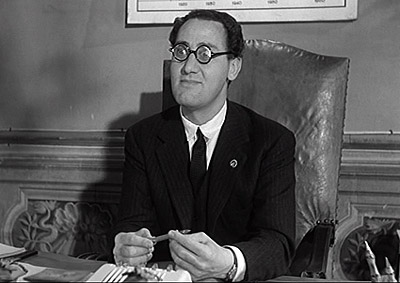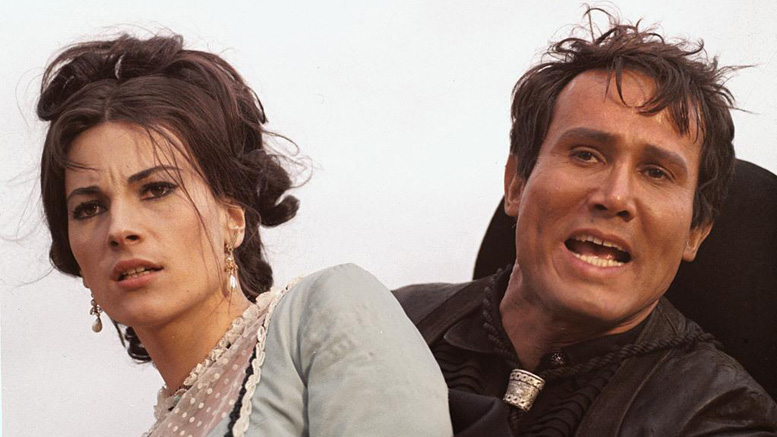
Although he was already a top-drawer star at the time, Alberto Sordi’s career really went into overdrive in 1959. He appeared in 10 different films that year, and although some of his parts were really little more than glorified cameos (ie Policarpo, ufficiale di scrittura), the majority were bona-fide starring roles. And the thing that really stands out about them is just how versatile a performer he actually was. He’s almost unrecognizable here, for instance, than as the lary, lazy everyman he portrayed in the likes of Il marito (58), or at least for the majority of the running time…
He plays Agostino, the newly employed Secretary of the International Office of Public Morality, a vast bureaucratic institution headed by an easygoing president (Vittorio De Sica). His job is to ensure that all those who want to push against the boundaries of what’s decent – nightclub owners, film makers and the like – are kept in check, and it’s a task he throws himself into with some enthusiasm. Before long, much of the seemier side of Rome is in fear of his authority, not least because he proves completely impervious to bribery, threats, sexual advances from attractive young ladies or persuasion of just about any kind.
Despite all his hard work, he does find the time to woo the President’s daughter, Virginia (Franca Valeri), albeit in a rather restrained, correct fashion. Virginia, in fact, is rather confounded by his restraint and tries her hardest to awaken the passion within him, with limited results at best. She’s also becoming frustrated by his inability to enjoy the good things in life, things like… nightclubs, films, and the very types of enterprise he’s so censorious about.
As a reward for his good work, and partly to get him out of the way while the President has an affair with a voluptuous young actress, he’s sent to a conference in Munich. Once there, though, his true nature begins to become apparent: he accidentally takes some colleagues to a strip club, and rather obviously enjoys the performance. As if that wasn’t enough, he then proceeds to chat up the stripper, Monique (Maria Perschy); starts a fight in a nightclub; and lechers after a number of showgirls. So caught up with it all does he become that he tries to import a group of risqué dancers back into Italy to work in the clubs, but it’s a double life which doesn’t sit happily with his job at the ministry.
As a film, undoubtedly the best thing about Il moralista is the extremely cheeky concept. As far as cocking-a-snoop towards the censors and moral guardians of the time goes, it would be difficult come up with a more unsubtle and provocative way to do it, with all of the employees of the Office of Public Morality portrayed as being just as flawed and licentious as everybody else, if not even more so. Apparently the character of Agostino was based on a real person, one Agostino Greggi, a local government employee and founder of the ‘Associazione dei padri dei famiglia’, which makes this the equivalent of having a film about Mary Whitehouse or Tipper Gore, and portraying them as being sex crazed deviants once their puritanical facades are dropped.
From a technical perspective, it has an old fashioned feel. Almost all of it was shot on the Cinecitta stages, with almost no exteriors at all, and it has the familiar theatrical feel of many productions of the time. Giorgio Bianchi’s direction is rather uninspiring; it does the job, but little more. In fact it feels a little as though he’s gone backward since Il nipote Sabelle, made the previous year, maybe because he trusted his actors to such a degree that he preferred not to embellish their performances with any kind of directorial intrusions. The script, though, is good, as you’d expect coming from such experienced writers as Oreste Biancoli (Bicycle Thieves (48)), Rodolfo Sonego (Roma ore 11 (52)) and Ettore Maria Margadonna (who wrote many of the Pane, amore… films that were popular throughout the 50s). It’s not really a laugh out loud kind of film, and the idea is definitely more amusing than the dialogue or the set-pieces, but there are a couple of amusing sequences (such as the weird international conference on immorality).
Sordi, though, is great, portraying a moral absolutist who is forced to come face to face with his own baser nature. He’s ably supported by a fine comic cast, including the excellent Franco Fabrizi, Vittorio De Sica and most especially Franca Valeri, a strange looking lady who’s probably the funniest thing in it. It also marked the Italian debut of Maria Perschy, who’d go on to have a busy career in International co-productions, and has a rare performance from Gina Mattarolo, a prominent acting teacher of the time who only on screen a handful of times.
Considering the subject matter, it’s perhaps unsurprising that it fell victim to censorship itself, being considered inappropriate viewing for minors. Given that, it did pretty well, making a total of 485 million lire on its initial release.
Il moralista
Year: 1959
Aka: The Moralist
Length: 98 mins
Country: Italy
Produced by Fabio Jegher for Avers Filmnapoleon
Distribution: WB
Director: Giorgio Bianchi
Screenplay: Oreste Biancoli, Luciana Corda, Ettore Maria Margadonna, Rodolfo Sonego, Vincenzo Talarico
Cinematography: Alvaro Mancori
Music: Carlo Savina
Editor: Adriana Novelli
Art direction: Piero Filippone
Cast: Alberto Sordi (Agostino), Vittorio De Sica (the president), Franca Valeri (Virginia), Mara Berni (Vera Serni, the actress), Maria Perschy (Monique), Leopoldo Trieste (the designer), Franco Fabrizi (Giovanni, a nightclub owner), Nando Angelini (Dr Menegotti), Piera Arico (Giovanni’s girlfriend), Ciccio Barbi (the police commissioner in the ‘Caracas’ pub), Mimo Billi (the producer), Renzo Cesana (a commissioner), Liana Del Balzo (the baroness), Anna Filippini (a callgirl), Gina Mattarolo (Eleonora, Agostino’s secretary), Christiane Nielsen (Marga), Hazel Rogers (herself), Lidia Simoneschi (Vera’s mother), Vincenzo Talarico (Man with Vera in OIMP), Carl Wery (Kruger), Sylvia Lopez (a call girl), Mimmo Poli (the policeman in the forest), Alberto Plebani (Count Bertinacci)

